
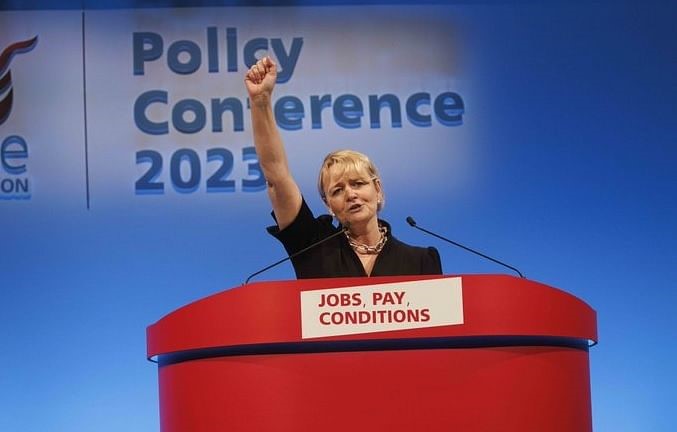
Message from Sharon Graham, Unite General Secretary: As we begin to ready ourselves for another season of negotiations, the context for collective bargaining remains favourable
It’s February and many of our negotiators are starting to look to the next pay round. Most of our wage claims are due to be submitted between April and June and therefore the current economic context is important.
To that end, in recent weeks the Government has been heralding the fall of inflation. The fact that they have had next to nothing to do with any drop off does not seem to matter. They are politicians after all.
But inevitably when negotiations commence, most employers will use lines from Government rhetoric as propaganda. Particularly if they support arguments for pay restraint.
But this is no time to give them much credence.
Profits across most sectors remain buoyant and falling inflation does not mean that prices are falling for our members. Quite the opposite, the cost of goods and services are still rising. In fact, inflation has risen by 30% in four years, meaning that just to stand still, workers would have had to see their pay increase by the same percentage.
Also, don’t be surprised to hear employers using economic forecasts showing predictions of further falls in inflation this year. But as we show in this month’s Facts and Figures traditional economists have a track record of getting this wrong. Remember, most did not predict the cost-of-living crisis and there are still many underlying factors helping drive inflation above the Bank of England target, not least profiteering!
The conditions for wage bargaining for many, many of our bargaining units remain very good. We should go into this pay season with confidence as our Union continues to win at the workplace.
We have now secured over £430 million in additional pay and benefits because of successful disputes. In the last month alone, our negotiations have secured further pacesetting deals.
Amongst the most recent examples is the settlement for thousands of construction workers operating under the National Agreement for the Engineering Construction Industry (NAECI). There we won a 17.4% pay rise over two years after a campaign that included the threat of co-ordinated industrial action. The employers had originally offered 8.5% for 2024 and 3.5% for 2025.
In the next few weeks, we will be announcing further offers of assistance for frontline negotiators, including help with costing proposals and possible settlements on the day of negotiations.
If you have any questions or ideas for what extra support we could provide, please don’t hesitate to contact me.
In Solidarity, Sharon
In this issue:
Cost of living Inflation remains high at 4.9%, and a long period of high price rises has had a huge impact on real wages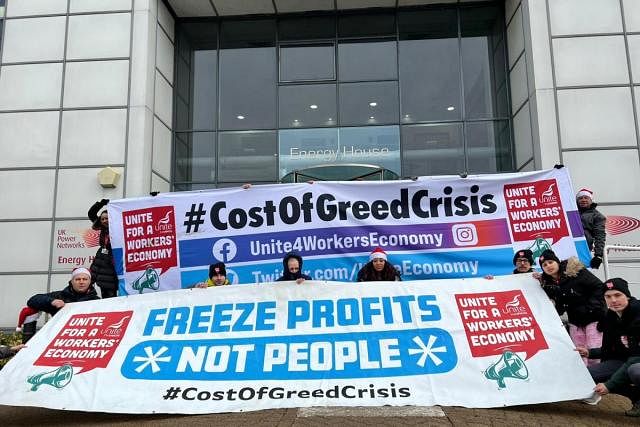 |
Member news Unite achieved major wins this month in construction, automotive, refuse, and manufacturing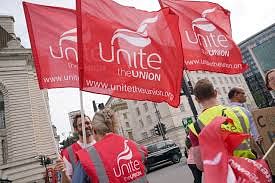 |
Economic update Unemployment rate stands at 3.8%, which is low by historical standards 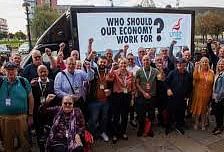 |
Bitesized Bargaining Unite’s Collective Agreements Database helps build bargaining power using information from other Reps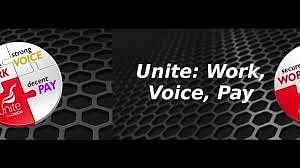 |
Story of the month: Seagate manufacturing workers secure collective bargaining rights in a historic vote
| A leader of the Seagate campaign speaks about their experiences and how to beat anti-union employers |
| Seagate workers voted overwhelmingly in favour of trade union recognition at their site in Springtown, Northern Ireland this month. The vote was taken among 540 manufacturing specialists and is the result of a multi-year campaign by union activists and Unite’s organising department. Prior to the campaign, it was widely believed that there would never be a union at Seagate’s Springtown site, which makes specialist parts for hard drives. The company did everything in their power to obstruct the campaign – but in the face of these obstacles, workers remained determined and focused on their right to collective bargaining. The construction of the union at the Seagate site shows that unions can be built anywhere. |
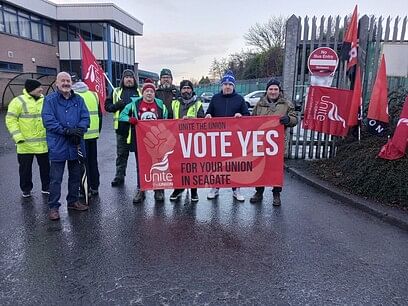 |
| Seagate workers campaigning for union recognition |
| Unite spoke to one of the leaders of the Seagate campaign about their experiences. What was the best moment in the campaign? “The best moment was finding out the result. We were quietly optimistic that we had the numbers, but you just never know until you get the confirmation. And then the elation, the relief, and the joy at having got the result.” What support did you get from Unite, the wider movement, and the community? “You can really see why the people at Unite are in those jobs, they’re experts in their field! And they had everything covered. Lynn [the organiser] basically predicted what was going to happen the whole way through, 99% of what she said could happen, did happen. So it was good to have that knowledge. We had tried it previously, to try to get the numbers to grow, but we never succeeded. This was our fifth attempt in 28 years. To get it over the line after 28 years is brilliant. And within the community, the support from family, support from friends, from colleagues, inside and outside the factory. We held local meetings at a couple of local venues, and we had councillors coming to the meetings, offering their support and solidarity.” What have you learned about being a trade unionist from the campaign? “I’ve never been involved in something like this before. It’s definitely hard work, it’s time-consuming when you’re canvassing people. And the biggest thing for me was being truthful – telling people the truth. Nothing but facts and figures that were truthful. On the employer side of the campaign they were giving subliminal messaging, and even the way they were wording their literature, it wasn’t 100% accurate.” How can we win against anti-union employers like Seagate? “It’s important to hold your nerve, first of all, and believe in what you’re doing. There’ll be times when you’re nervous, and you think God, is this going to happen. It was definitely very nerve-wracking, throughout the campaign. Staying focused and being mindful that it might take longer than expected. Trying to keep people on board, trying to keep people from becoming disillusioned. Just keeping the faith and believing that you’re going to get to your goal.” What’s next for the Seagate workers? “Get everything in place, and get our union reps elected. Get that official recognition sorted, and get them working with the people on the site. Get our reps trained, as well. I’ve been an employee for years, and I’m experienced, but I don’t have the knowledge that trained reps would have. There’s a good appetite among other groups on site to get unionised and have collective bargaining, too.” |
| The full Seagate story is available in Facts and Figures: click on the logo below to access this month’s edition of Unite’s new tool for negotiators |
| Cost of Living |
| Inflation remains high at 4.9% and a long period of high price rises has had a huge impact on real wages |
| The Retail Price Index (RPI) measure of inflation currently stands at 4.9%, down slightly from 5.2% the previous month. According to Chancellor Jeremy Hunt, this is proof that “the plan is working”. However in the real world, working people know all too well that falling inflation does not mean falling prices, and prices are still continuing to rise on the back on some of the highest increases in a generation. |
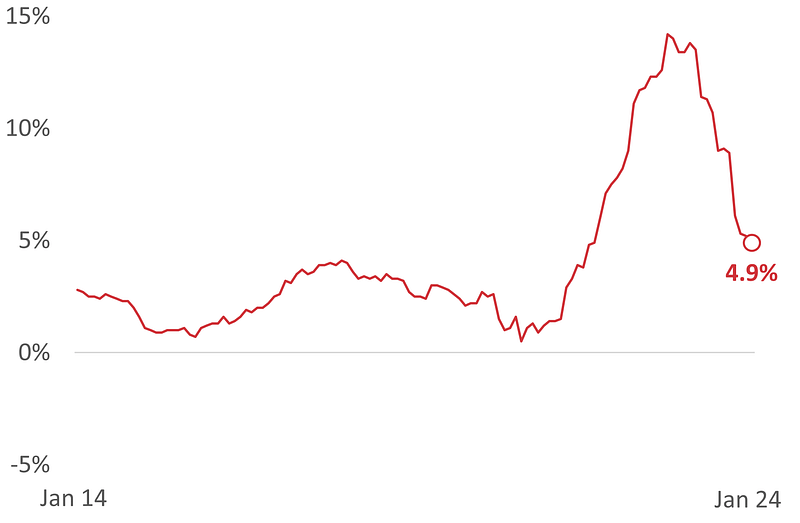 |
| RPI continues to be at some of the highest rates in the last 10 years. Retail Price Index, All Items: Percentage change over 12 months, 2014 to present. Source: ONS |
| Why do we use RPI? |
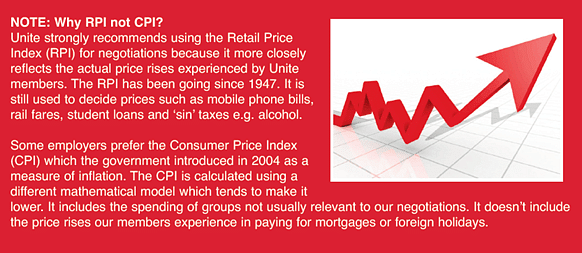 |
| In RPI but not in CPI In CPI but not in RPI Mortgage payments The top 4% of households by income What you spend on holiday Pensioner only households Stock brokers fees Spending by foreign tourists |
| Prices of categories such as clothing and food are rising faster than headline inflation, at 12% and 7% respectively |
| Overall inflation is just under 5%, but the vital categories of Clothing & footwear (over 12%) and Food (nearly 7%) are even higher than that. The cost of these items has a huge impact on workers’ standard of living. Unite Investigates has shown that these increases are driven by profiteering in these sectors. Workers should not have to pay for the bosses’ cost of greed crisis. |
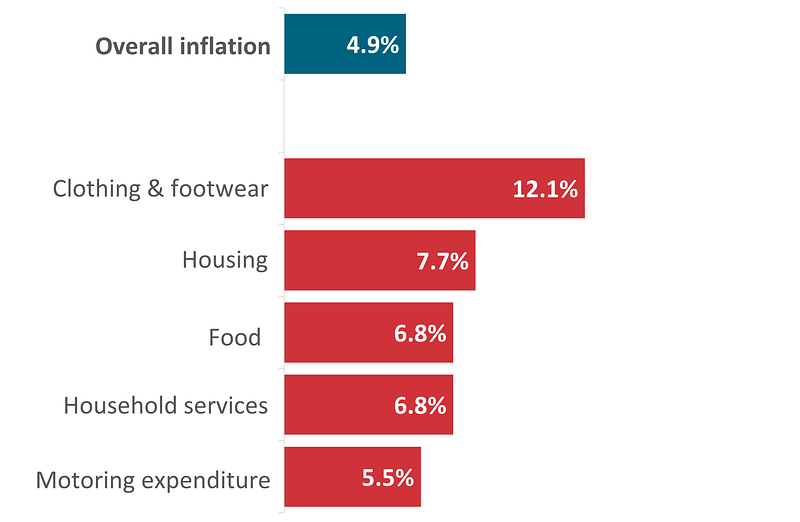 |
| Some categories are substantially higher than overall inflation. RPI, Selected changes: Percentage change over 12 months, Jan 2024. Source: ONS |
| Prices have risen by a massive 27% since March 2021, with the price of fuel and light increasing by an astonishing 90% over that period |
| It has been nearly three years since inflation rose above the Government’s target of 2% and this is having a massive impact on real wages. News headlines may talk about a drop in the price of fuel and light and other items, but if we extend the period covered back to March 2021 we see that fuel and light leads a whole host of categories that have seen incredibly large increases. If inflation had kept to the Government’s target, prices would now be about 6% higher than in March 2021. In reality: they are over 27% higher. |
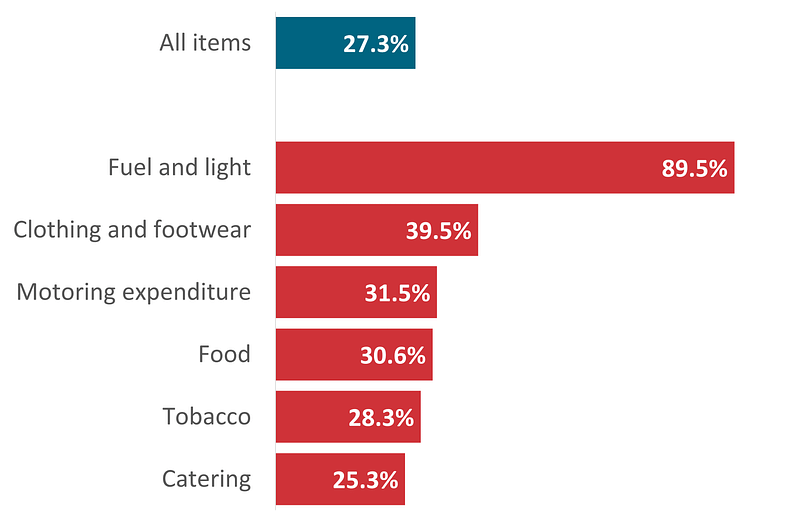 |
| We have seen huge price increases across all key categories. RPI percentage change March 2021 to January 2024. Source: ONS |
| Falling inflation does not mean falling prices |
| A number of forecasts anticipate inflation to fall in the medium-term, but even then it is still expected to be high by historical standards. Even if inflation falls it does not mean that prices will. It just means that prices may not grow as fast as they have done. Prices for essential items like energy and food are expected to remain especially high. Workers winning wage increases will ensure they do not lose out permanently from the rise in prices. |
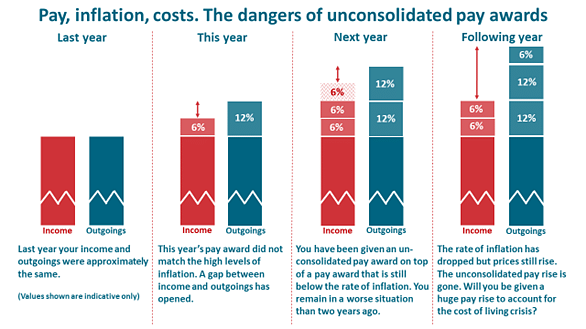 |
| Interest rate rises are worsening the cost-of-living crisis for homeowners, renters, and households with consumer debt |
| At 5.25%, official interest rates remain at their highest level in the last 15 years. This has led to soaring mortgage rates, which are currently at historically high levels. This doesn’t just affect homeowners: renters pay the price too, as landlords attempt to recoup higher mortgage costs by increasing rents. Soaring interest rates also increase the cost of repaying consumer debt, such as credit card debt. As of November 2023, total unsecured consumer debt stood at £221.4 billion, or £7,885 per household. Of this, total credit card debt stood at £68.9 billion, or £2,452 per household. Both figures have jumped in the last year, with workers increasingly struggling to keep up. Politicians need to wake up. It’s only by taking on runaway profiteering that we can end the cost of living crisis and its devastating impact on the lives of workers. |
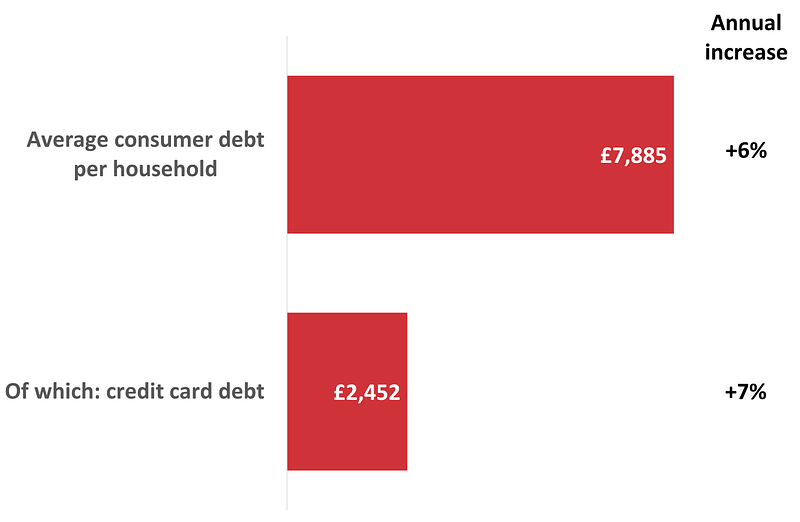 |
| Average unsecured consumer debt per household, November 2023, and increase compared to a year earlier. Source: The Money Charity |
| Member news |
| Unite achieved major wins this month in construction, automotive, refuse, and manufacturing |
| Unite members and Reps are leading the fight for jobs, pay and conditions, with a number of major victories in the last month. Backed by their members and the resources of their union, Officers and Reps have secured a number of big wins. Thousands of construction workers operating under the National Agreement for the Engineering Construction Industry (NAECI) won an outstanding 17.4% pay rise over two years after a campaign by Unite. 3,000 Unite members who carry out essential repair and maintenance at oil refineries, power stations, and pharmaceutical and petro-chemical plants will receive an 11.3% pay rise from January 2024 and at least a further 5.5% from January 2025. The bosses had originally offered just 8.5% for 2024 and 3.5% for 2025. However, workers balloted to take co-ordinated strike action across NAECI employers, forcing the employers to offer an improved deal rather than face unrest across the entire sector. This deal shows that when workers organise and act collectively they can achieve major wins across entire sectors. |
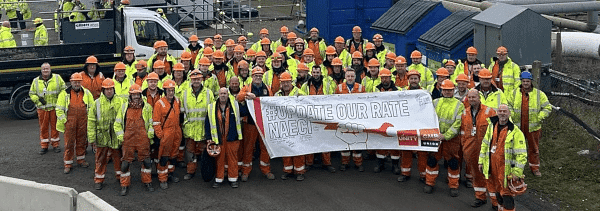 |
| Workers from NAECI fighting for better pay |
| Unite has secured two significant deals for refuse workers at Cheshire West Recycling and Suez in Huddersfield. At Cheshire West Recycling workers secured a deal worth between 7% and 11.8% dependent on grade. The deal will be backdated to April 2023 and also includes an increase of two days annual leave. The pay increase came after 170 workers voted for strike action. At Suez in Huddersfield, workers won a 10% pay rise backdated to April 2023 and an RPI inflation rise from April 2024. This deal was won after more than 100 workers voted for industrial action. The threat of industrial action persuaded both employers to offer good deals, demonstrating the power of collective action in the workplace. |
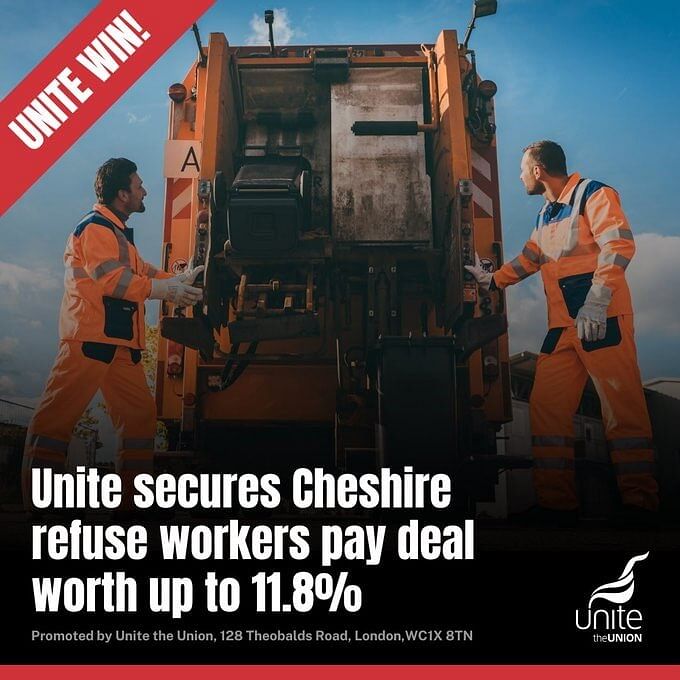 |
| Cheshire refuse workers win double figure pay deal |
| Unite members at 19 employers across Britain and Ireland are due to take industrial action in February |
| Hundreds of Unite members at 19 workplaces are set to take industrial action in February. In 2023, nearly 90,000 Unite members together entered into more than 550 disputes. Since 2021, eight out of every 10 results have been a success and Unite has delivered an extra £430 million for members. That is the Unite premium, the benefit of being a member of the UK’s leading union. Over 180 Unite members, employed by Suntory Beverage & Food, are set to take strike action at the Royal Forest Factory in Gloucestershire for the first time since the 1970s. A week of strike action began on Monday 5 February after management failed to address the cost-of-living crisis. Workers had received a two-year pay deal effective from 1 April 2022, with a commitment that the employer would review the second year’s increase if inflation exceeded 5% between January and June 2023. Despite the inflation rate far exceeding this limit, Suntory, which made a pre-tax profit of £1.62 billion in 2022, refused to honour its original commitment to review the pay deal in line with inflation, to provide workers a fair wage. Workers at the Royal Forest Factory are going out on strike, disrupting production of household name drinks, including Lucozade Energy, Lucozade Sport, and Ribena, resulting in empty supermarket shelves. |
 |
| Workers on the picket line at Suntory |
| 14,600 Unite members in sectors such as RTC, Food and CPPT are due to negotiate with over 100 employers this month |
| Unite’s Pay and Anniversary Date database, part of the Work Voice Pay suite of tools, can help us co-ordinate action across employers and sectors. By coordinating anniversary dates, we can benchmark pay rises and build power across our industries. While April, the start of the new financial year, is the most common time for pay agreements, thousands of members are negotiating every single month. This February there will around 14,600 members at over 100 different employers negotiating their pay and conditions. Below shows the top 10 largest employers where negotiations are due to take place in February 2024. High quality information is vital for coordinating action across industries. Unite is currently working on several projects to gather information and data to help our members win, as well as projects to make use of the data we already have. |
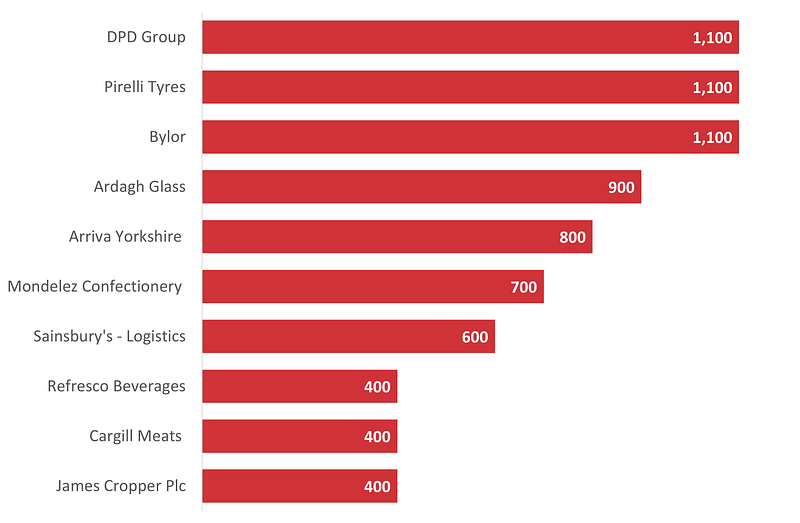 |
| Top 10 largest employers negotiating pay deals in Feb 24, Source: Unite |
| BlackRock is acquiring GIP for $12.5 billion, affecting Unite members at Peel Ports and Gatwick Airport |
| The US asset management giant BlackRock is acquiring infrastructure investment fund manager Global Infrastructure Partners (GIP) for $12.5 billion. The deal will see BlackRock extend its reach to the various ports, airports, and energy infrastructure investments managed by GIP. Most notably, these investments include Gatwick Airport and the eight ports operated by Peel Ports – together home to thousands of Unite members. BlackRock is the world’s largest asset manager, with over $9 trillion invested across the world. Unite will fight to ensure that the thousands of Unite members currently working at Gatwick Airport and the various ports owned by Peel don’t suffer from the change in ownership. |
| Economic update |
| At 3.8%, the unemployment rate remains historically low, boosting workers’ bargaining position |
| ONS labour market data is currently under review due to concerns over its accuracy, but the latest release shows that the: Employment rate was up on both the year and on the quarter, at 75.0%; Unemployment rate stands at 3.8%, which is low by historical standards; & Economic inactivity rate is largely unchanged, at 21.9%. |
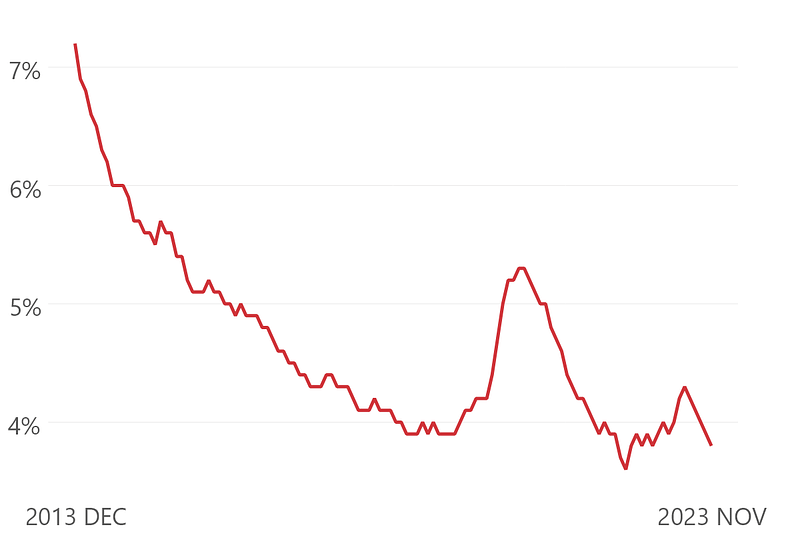 |
| The unemployment rate is currently historically low. Unemployment rate Dec 2013 to Nov 2023. Source: Labour Market Statistics, ONS |
| Bitesize Bargaining |
| Unite’s Collective Agreements Database helps build bargaining power using information from other Reps |
| Coordinated collective action by workers is feared by employers across the world. Anti-union legislation has blunted workers’ ability to defend their jobs, pay and conditions, and employers have also engaged in a deliberate strategy of fragmentation to break up workers’ power as far as possible. One way that workers can increase their collective bargaining power is by citing best practice and winning examples from other Unite Reps and Shop Stewards. The Collective Agreements Database does exactly this, allowing you to model an agreement based on what others in a similar sector have already agreed. Demonstrating that a similar employer has already agreed to something that you are actively fighting for can also help build leverage. Unite’s Collective Agreements Database allows you to either search the database for other Unite agreements, or upload an agreement to the database yourself. On the front of the page, you have the options to either search the database or upload to the database, with videos to guide you through the process: |
 |
| If you select ‘Search the Database’, you will get taken to a search bar, where you can filter on specific sectors and regions. You can also search by company names or keywords (e.g. “recognition”, “sick pay”). When you find a useful agreement, you can use the scrapbook feature to copy the text into a new file. Simply highlight the area you need to read and the scrapbook will generate text that you can then copy and paste elsewhere. |
 |
| Uploading an agreement is also quick and easy to do. Once you have selected this option, you will be taken to a page with a number of fields to classify the agreement you plan to upload. |
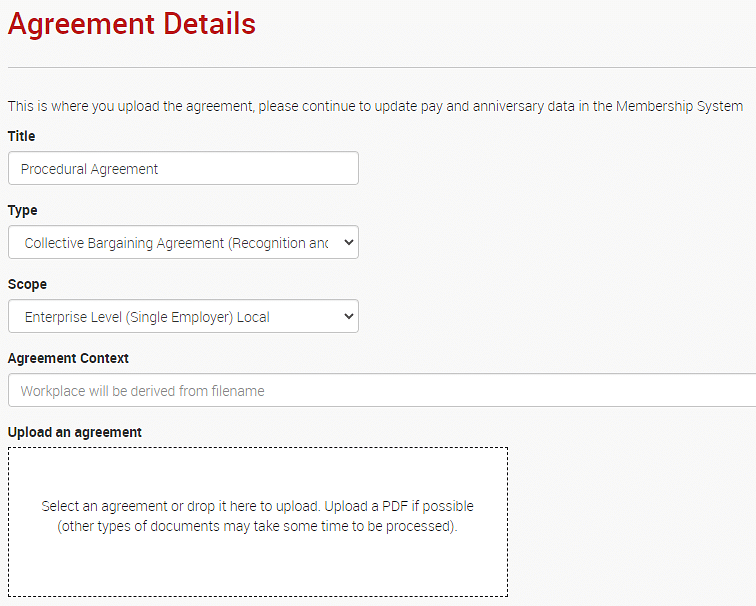 |
| First, add a quick title for the agreement. Then, select whether the agreement concerns Collective Bargaining; Pay and Conditions; or any additional agreements (e.g. agency or outsourcing). Next, select the scope of the agreement – if it is at enterprise level, select whether it is local or national. You can also add sector level agreements that cover multiple employees. Finally, you can add a short description of what the agreement covers, and upload the file itself. When this is done, your file will be successfully uploaded to Unite’s collective agreements database. The Collective Agreements Database has helped many Reps and Shop Stewards both develop new agreements, and add important clauses to existing ones. But its strength lies in having as many agreements stored as possible, and updating them when necessary. If you have yet to upload an agreement for your workplace, or have recently negotiated a new one, access the Collective Agreements here. |
| Work Voice Pay now has a large suite of tools for Unite Reps |
| Financial Insider Understand your company’s real financial position, so you can negotiate good pay awards and spread the message of what’s really going on. Pay Claim Generator If you are a Rep negotiating with a UK registered company you can now construct your own bespoke pay claim online in less than 10 minutes using the Pay Claim Generator! Collective Agreement Builder Unite Reps can now construct a bespoke, fully laid-out collective agreement online in a matter of minutes, using the Collective Agreement Builder. |
| Click on the Work Voice Pay logo to see the rest of our bargaining guides and tools |
| Share Work Voice Pay Monthly! |
| We want Work Voice Pay Monthly to be read by all of our Reps. Share this with your fellow activists and encourage them to sign up to our monthly updates at workvoicepay@unitetheunion.org |
